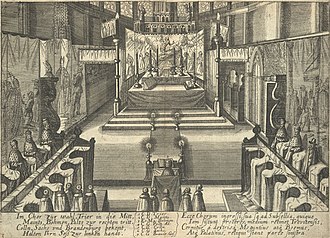The topic of this article may not meet Wikipedia's general notability guideline .(December 2025) |
| |||||||||||||||||
| |||||||||||||||||
| |||||||||||||||||

The imperial election of 1612 was an imperial election held to select the emperor of the Holy Roman Empire. It took place in Frankfurt on 13 June.
The topic of this article may not meet Wikipedia's general notability guideline .(December 2025) |
| |||||||||||||||||
| |||||||||||||||||
| |||||||||||||||||

The imperial election of 1612 was an imperial election held to select the emperor of the Holy Roman Empire. It took place in Frankfurt on 13 June.
The previous Holy Roman Emperor, Rudolf II, Holy Roman Emperor, died on 20 January. The prince-electors convened to replace him were:
Ferdinand promoted the election of his brother-in-law Maximilian I, duke of Bavaria as emperor; however, Maximilian refused to accept the throne. Instead, Rudolf's next surviving brother, Matthias, who had already taken power in Bohemia and Hungary, was elected. He was crowned on 26 June in Frankfurt.
| Elector | Electorate | Vote |
|---|---|---|
| Ferdinand of Bavaria | Cologne | Matthias |
| Philipp Christoph von Sötern | Trier | Matthias |
| Maximilian I | Bavaria | Matthias |
| John George I | Saxony | Matthias |
| Frederick IV | Palatinate | Matthias |
| Matthias | Bohemia | Matthias (voted for himself) |
| Lothar Franz von Schönborn | Mainz | Matthias |
| Total | 7 votes, 100% (unanimous) | |